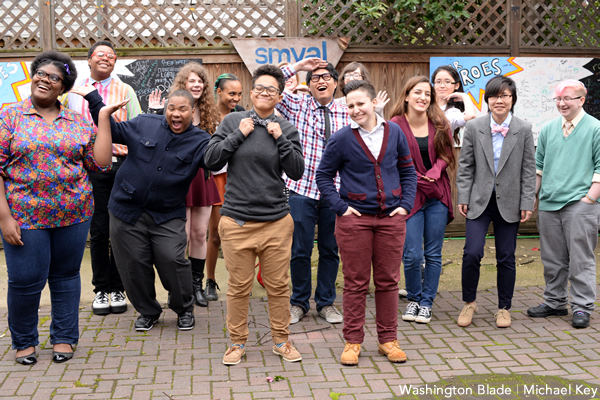a&e features
Young and proud
20 youths reflect on coming out early and misconceptions about millennials
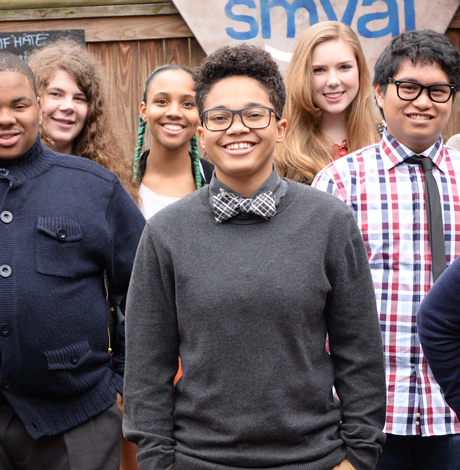
Youth Pride will be here soon. LGBT young people from all over the D.C. area will spend Saturday, May 2 from noon-5 p.m. in Dupont Circle enjoying performances, games, speakers, testimonials and more (details at youthpridealliance.org).
To celebrate this year’s event, Washington Blade staff teamed up with SMYAL to profile 20 local youths 20 and under. Their perspectives encompass the full range of queer teen experience from bullying and harassment to acceptance and joy.
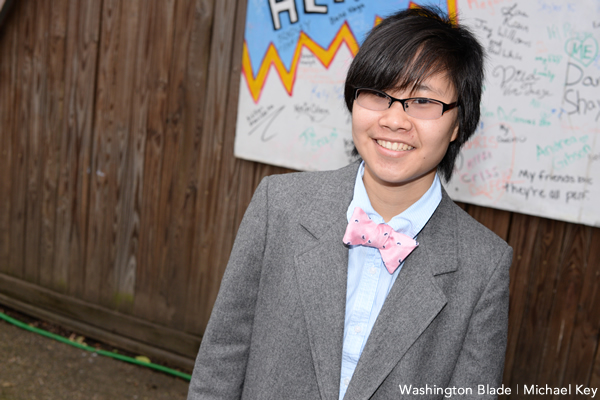
Carolyn Kidd (Washington Blade photo by Michael Key)
NAME: Carolyn Kidd
AGE: 20
RESIDENCE: Maryland
ID AS: genderqueer/queer
CAME OUT: senior year of high school
1. What kind of reaction have you received being out at school?
The reaction of my peers has mostly been positive. However when I attended Duquesne University, a Catholic university in Pittsburgh, I experienced bigotry and “aversion” to “the gay lifestyle.” At St. Mary’s College of Maryland, I experienced a kind of gay euphoria and was accepted … and was able to start a club for trans students.
2. How have your family, friends and community reacted?
My family and friends reacted positively, however my parents were concerned about how being out would impact my future.
3. Have there been any benefits/downsides to being out?
There have been no overt downsides to being out, but hearing people openly badmouth the LGBT community is hard.
4. What’s been the hardest or best part of being out?
The hardest is constantly being misgendered whether it’s being called “sir,” “young lady” or using the wrong pronouns.
5. Did you go to Youth Pride last year?
No
6. What is the biggest misconception LGBT Boomers and Gen Xers have about LGBT Millennials?
That trans people are cross dressers and confused. Trans folks are often excluded.
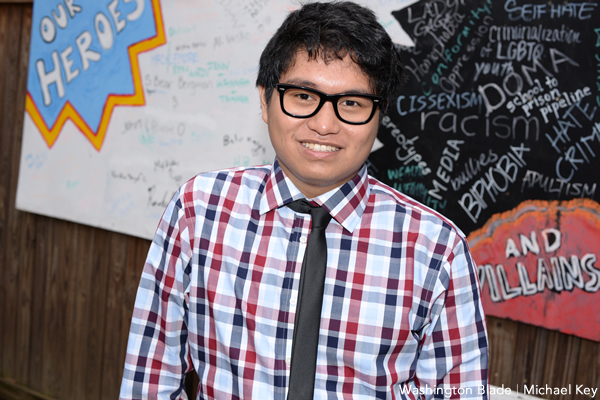
Jason Adle (Washington Blade photo by Michael Key)
NAME: Jason Adle
AGE: 16
RESIDENCE: Gaithersburg, Md.
ID AS: gay
CAME OUT: 2010-ish
1. What kind of reaction have you received being out at school?
The reaction at school has been neutral at worst and encouraging at best. For the most part, encouraging and supportive.
2. How have your family, friends and community reacted?
By and large, supportive and positive.
3. Have there been any benefits/downsides to being out?
The main benefit is that there is no stress to not be yourself. You can be you to the Nth degree.
4. What’s been the hardest or best part of being out?
The worst part is having to deal with those who you did not want to know your identity at a certain time. But on the flip side, it is absolutely great not having to feel trapped in being something you’re not.
5. Did you go to Youth Pride last year?
I did. It was a great time to hang out with friends and meet new people and learn about/interact with organizations that were helping further the cause.
6. What is the biggest misconception LGBT Boomers and Gen Xers have about LGBT Millennials?
I think the biggest disconnect is how aware Millennials appear to be in regard to LGBT history. We may not have lived in certain parts of LGBT history, but we are well aware of the events that have led to today.
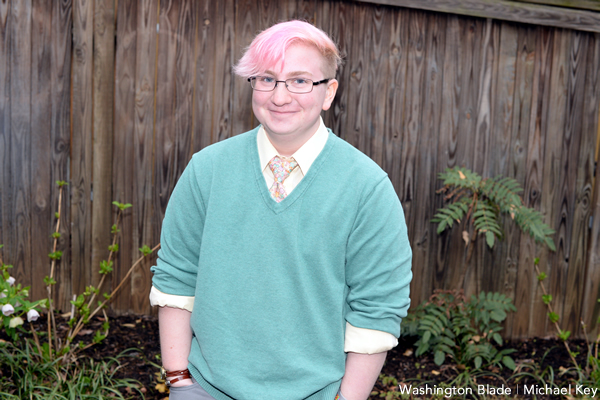
Azariah Kurlantzick (Washington Blade photo by Michael Key.
NAME: Azariah Kurlantzick
AGE: 17
RESIDENCE: Potomac, Md.
ID AS: queer/trans boy
CAME OUT: May 2011 as bi (in seventh grade); summer 2012 as transgender, just before ninth grade
1. What kind of reaction have you received being out at school?
When I first came out as bi, I was attending a Jewish day school so it was sometimes weird for me when taking part in class discussions on whether homosexuality is a sin, but reactions were generally fine. I was still at that school when I came out as transgender and I did encounter some people who refused to use my new name and pronouns, but with the help of Keshet, a Jewish LGBT organization, I was met with support.
2. How have your family, friends and community reacted?
My family and friends have been very accepting and although my Jewish community had a bad reaction initially, it has become more positive. Now that I’m attending public school for the first time in 11th grade, I hear a lot of homophobic slurs directed at me in class and in the halls, but whenever I talk to people, they seem accepting.
3. Have there been any benefits/downsides to being out?
A big benefit of being out is that I feel more comfortable now exploring my gender presentation. Before, I felt the need to present as very masculine so that people might read me as a girl. Now, though, I feel more comfortable doing things like dying my hair pink because I can assume that most people do not see me as a girl.
4. What’s been the hardest or best part of being out?
The best part is that I am now part of a wonderful community that I wouldn’t have access to were I still in the closet.
5. Did you go to Youth Pride last year?
It was a good event, but adults there kept referring to the trans people I was with as ladies.
6. What is the biggest misconception LGBT Boomers and Gen Xers have about LGBT Millennials?
That there are fewer of us than there actually are and that all of us are cisgender.
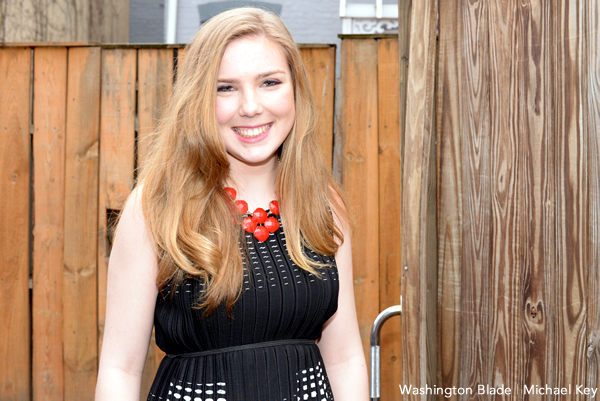
Carly Carter (Washington Blade photo by Michael Key)
NAME: Carly Carter
AGE: 18
RESIDENCE: Herndon, Va.
ID AS: lesbian/queer
CAME OUT: March 26, 2014
1. What kind of reaction have you received being out at school?
Not a huge one. People were surprised but otherwise I didn’t get a lot of response. Occasionally, I hear a mean comment, but usually people are really supportive.
2. How have your family, friends and community reacted?
My friends are great! I could not have picked better friends. Most of us are queer actually, so that works out great. My mom and dad are still adjusting. … they have overall been crazy supportive. Not a mean word has ever come out of their mouths.
3. Have there been any benefits/downsides to being out?
Getting to be more open and honest with people is a huge plus. Also meeting a bunch of queer friends whom I love being in touch with. I would never have met them had I not been out.
4. What’s been the hardest or best part of being out?
There are challenges with everything — being out is not an exception.
5. Did you go to Youth Pride last year?
No, I didn’t know about it.
6. What is the biggest misconception LGBT Boomers and Gen Xers have about LGBT Millennials?
That we have it easy or that the hardships they had to face are gone now.
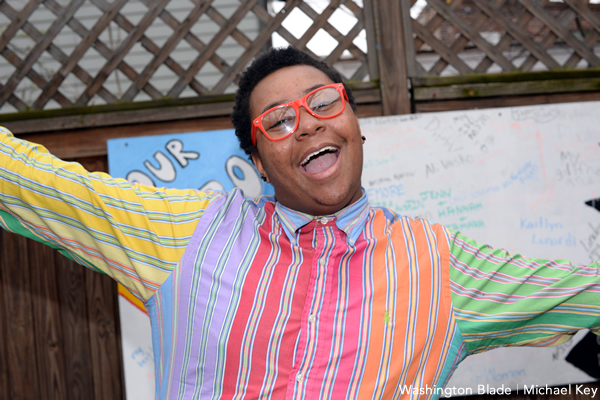
Autumn Smith (Washington Blade photo by Michael Key)
NAME: Autumn Smith
AGE: 18
RESIDENCE: D.C.
ID AS: male
CAME OUT: 2013
1. What kind of reaction have you received being out at school?
That I was “cool for being a gay guy” except when I wore women’s jewelry.
2. How have your family, friends and community reacted?
My family doesn’t talk about it. Friends are cool and it’s all good until I wear a dress.
3. Have there been any benefits/downsides to being out?
Oh yes!
4. What’s been the hardest or best part of being out?
Harassment, weird looks.
5. Did you go to Youth Pride last year?
Yes! It was amazing as always.
6. What is the biggest misconception LGBT Boomers and Gen Xers have about LGBT Millennials?
That our struggles can’t compare with theirs.
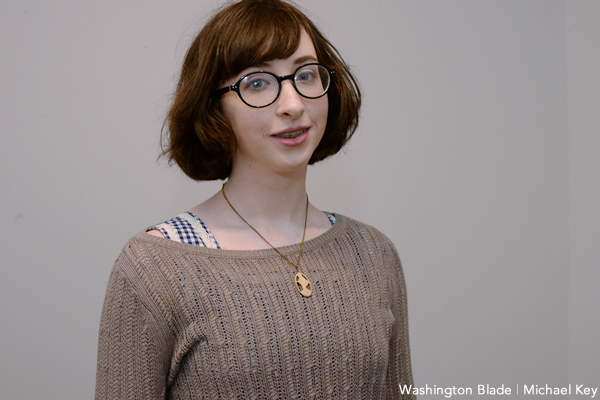
LC (Washington Blade photo by Michael Key)
NAME: LC (Lauren Collins)
AGE: 16
RESIDENCE: Herndon, Va.
ID AS: bisexual
CAME OUT: eighth grade
1. What kind of reaction have you received being out at school?
Mixed — positive from close friends, but neutral to negative from the student body.
2. How have your family, friends and community reacted?
Mom has come around and is supportive now. Dad said a couple insensitive things but he’s always supported me. My church and community are pretty OK with it.
3. Have there been any benefits/downsides to being out?
Being able to interact with openly queer friends and being able to share my relationships publicly. Downsides are backlash at school and it’s harder to fly under the radar.
4. What’s been the hardest or best part of being out?
Feeling like a representative for all queer people.
5. Did you go to Youth Pride last year?
N/A
6. What is the biggest misconception LGBT Boomers and Gen Xers have about LGBT Millennials?
That we’re just “confused” or saying we’re queer or trans just because it’s “trendy.”
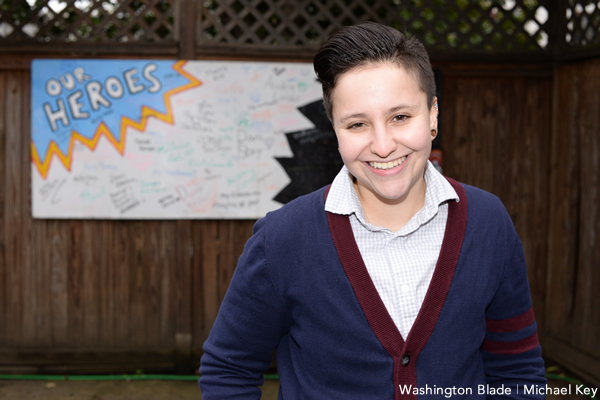
Katie Barack (Washington Blade photo by Michael Key)
NAME: Katie Barack
AGE: 19
RESIDENCE: McLean, Va.
ID AS: queer
CAME OUT: April 2013
1. What kind of reaction have you received being out at school?
I’ve been accepted by the community as someone who could fall in love with someone of any gender. However, I go to a “same-sex” boarding school, so all of my gender questioning has been pretty private. I’ve had to give a lot of advice to underclassmen. I love the leadership role and being the only out student has made me find an incredible community.
2. How have your family, friends and community reacted?
My family is very supportive. While my friends at school are supportive, my friends from home in the Midwest can be very ignorant and tend to make me feel “other.”
3. Have there been any benefits/downsides to being out?
I feel excluded often and school dances are awkward. In my tux, I’m called “sharp” while all the other students in dresses are called “gorgeous.”
4. What’s been the hardest or best part of being out?
I’ve found a community I would never trade. I love finding other queer people. Questioning my gender is something I’ve only recently come out about. It sucks that my high school diploma probably won’t have the name I use on it. I wish I could use the right pronouns and name, but I’m at an all-girls school. I’ve had to work my ass off to get us to be aware of transgender students and the need for accommodating policies.
5. Did you go to Youth Pride last year?
No
6. What is the biggest misconception LGBT Boomers and Gen Xers have about LGBT Millennials?
Transgender people are viewed as outsiders of the community by the older generation. Cultural intersectionality is ignored.
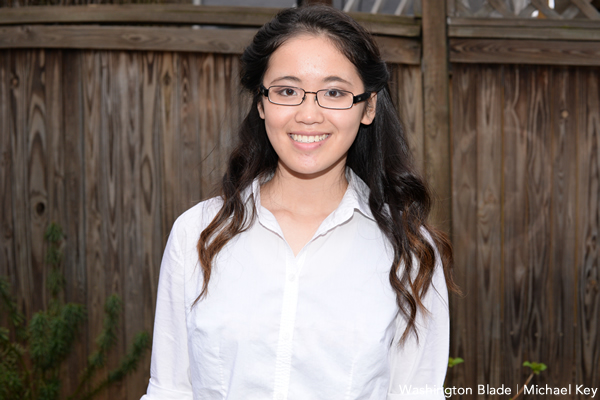
Lia Warner (Washington Blade photo by Michael Key)
NAME: Lia Warner
AGE: 16
RESIDENCE: Chesapeake, Va.
ID AS: lesbian
CAME OUT: 14
1. What kind of reaction have you received being out at school?
I was really lucky to be a member of a very accepting track and cross-country team, so in the locker room, I felt a lot safer than I anticipated. But I still heard homophobic slurs and comments elsewhere at school.
2. How have your family, friends and community reacted?
My parents have been overwhelmingly supportive as have my friends. Many members of the community as well, but that’s not to say it’s been 100 percent positive.
3. Have there been any benefits/downsides to being out?
A benefit would be, of course, the ability to be myself and be true to my identity with those I love. The downside, where I live is overwhelmingly homophobic and discriminatory.
4. What’s been the hardest or best part of being out?
The hardest — when people look at me in a different and negative light. The best — my ability to be myself publicly and help others in my GSA.
5. Did you go to Youth Pride last year?
No, I did not know about SMYAL or that event. I did go to Hampton Roads Pride, which was fabulous.
6. What is the biggest misconception LGBT Boomers and Gen Xers have about LGBT Millennials?
They believe this is a phase or that we’re somehow a mistake.
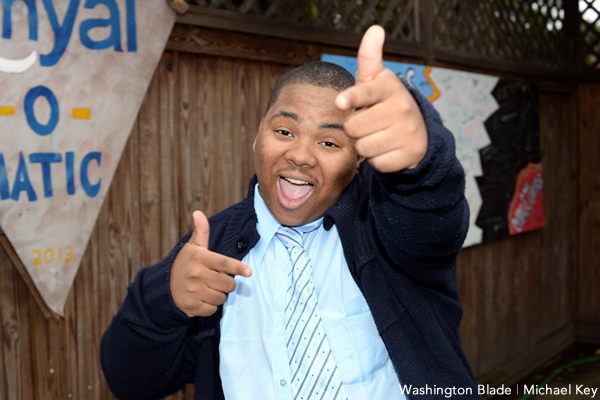
Rico Jones (Washington Blade photo by Michael Key)
NAME: Rico Jones
AGE: 15
RESIDENCE: none given
ID AS: bisexual
CAME OUT: This year
1. What kind of reaction have you received being out at school?
Mixed — happiness from some who were proud of me, but also a lot of bullying most of the time. I’ve been called a lot of names and picked on by many others.
2. How have your family, friends and community reacted?
My friends were all by my side and have wished me happiness and the best of luck.
3. Have there been any benefits/downsides to being out?
Benefits: happy to have found myself in so many ways, love and freedom. Downsides: bullying.
4. What’s been the hardest or best part of being out?
Bullying and the feeling that people think because you’re gay, you think you deserve special rights or treatment.
5. Did you go to Youth Pride last year?
No, I wish I had.
6. What is the biggest misconception LGBT Boomers and Gen Xers have about LGBT Millennials?
Being myself and being free and showing other people that we can be the change.
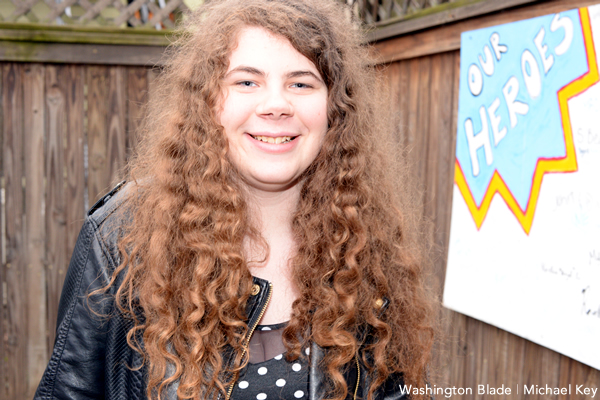
Sasha Jarvis (Washington Blade photo by Michael Key)
NAME: Sasha Jarvis
AGE: 18
RESIDENCE: Derwood, Md.
ID AS: bisexual
CAME OUT: ninth grade
1. What kind of reaction have you received being out at school?
Neutral
2. How have your family, friends and community reacted?
I’ve had a pretty positive reaction. The first person I came out to was my friend Kathryn and it felt so nice until she decided she had to tell her mom. So that was super uncomfortable because I wasn’t even out to my own parents. My favorite thing was when I casually dropped the word “girlfriend” without getting any kind of extreme response. That was affirming.
3. Have there been any benefits/downsides to being out?
I haven’t really felt any downsides personally but it is rewarding to not be sitting quietly and letting homophobes slide out of fear of judgment.
4. What’s been the hardest or best part of being out?
It’s annoying to hear hetero-normative language from people close to me. Like hearing my mom say my sisters and I should live alone or with a girlfriend (as in a female friend) before getting married. It hurts to not have my identity respected, even in small ways.
5. Did you go to Youth Pride last year?
Yes! I love being able to share my queer community life with my school friends.
6. What is the biggest misconception LGBT Boomers and Gen Xers have about LGBT Millennials?
I think the biggest misconception is that we’re all just following trends.
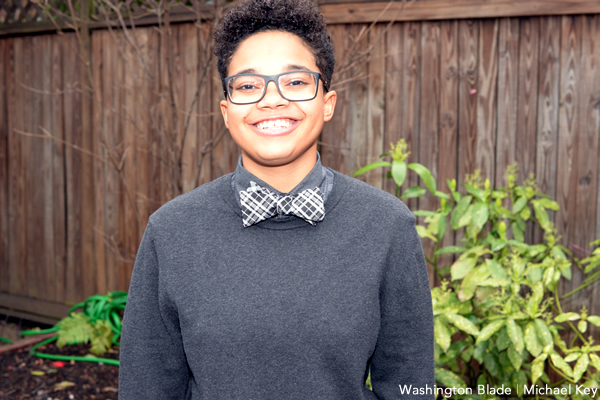
Gavin Calvin (Washington Blade photo by Michael Key)
NAME: Gavin Calvin
AGE: 16
RESIDENCE: Clarksburg, Md.
ID AS: transgender
CAME OUT: 8th grade
1. What kind of reaction have you received being out at school?
Very supportive and loving.
2. How have your family, friends and community reacted?
They were not surprised and supported me fully.
3. Have there been any benefits/downsides to being out?
Strangers not understanding my choices and judging.
4. What’s been the hardest or best part of being out?
I’m more comfortable around my peers and am happier living as who I truly am.
5. Did you go to Youth Pride last year?
No
6. What is the biggest misconception LGBT Boomers and Gen Xers have about LGBT Millennials?
(My generation) seems to think LGBT Boomers are reckless and carefree. My experience with Gen. Xers is that they think how we are is a choice and is wrong.
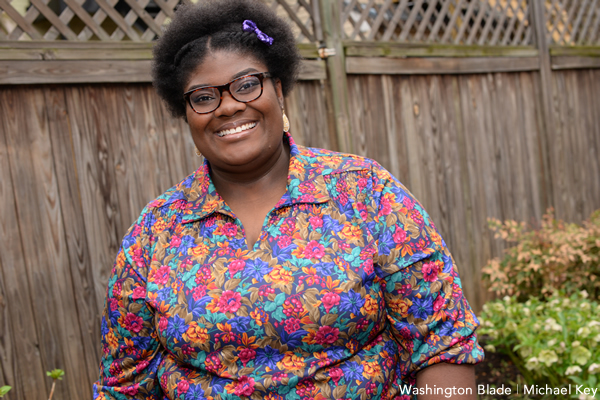
Erika Johnson (Washington Blade photo by Michael Key)
NAME: Erika Johnson
AGE: 18
RESIDENCE: Clinton, Md.
ID AS: lesbian
CAME OUT: 9th grade
1. What kind of reaction have you received being out at school?
I received a pretty positive reaction from my friends and teachers. A lot of my friends were shocked and surprised but very supportive.
2. How have your family, friends and community reacted?
My family on the other hand, doesn’t really understand. Most of them don’t know I’m out, but the few I trust fully support.
3. Have there been any benefits/downsides to being out?
The benefit of being out is that there are so many people I can relate to on a personal level. Being out has given me the spunk to go forth with my advocacy. The downside of being out is that not a lot of people fully understand my new points. Coming out in the ninth grade has been very stressful because I still feel like I’m hiding.
4. What’s been the hardest or best part of being out?
The hardest part about being out is that it is hard trying to express myself in front of people. I’m partially in the closet and partially not. The best part is that I can come to SMYAL and feel like the true me. SMYAL has made this process 100 percent easier. There are still some obstacles I have to get over, but I am a strong woman who can do anything.
5. Did you go to Youth Pride last year?
Yes! It was amazing. It was a pleasure meeting more SMYAL folks and getting to learn about queer youth experiences.
6. What is the biggest misconception LGBT Boomers and Gen Xers have about LGBT Millennials?
That we spend too much time “complaining” about what we need when we are really just speaking the truth.
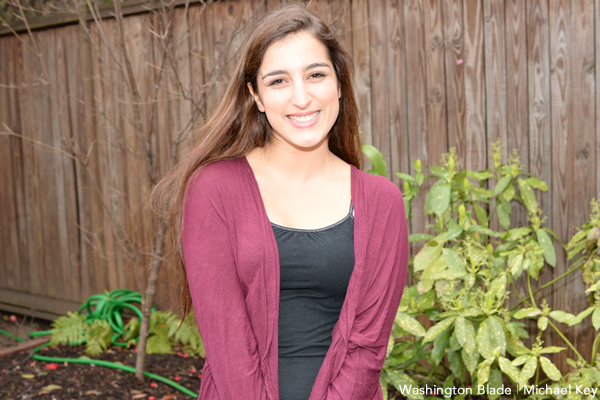
Selvi Ulusan (Washington Blade photo by Michael Key)
NAME: Selvi Ulusan
AGE: 16
RESIDENCE: Bethesda, Md.
ID AS: queer/bi
CAME OUT: June 20, 2013
1. What kind of reaction have you received being out at school?
Surprise mostly. I don’t think everyone knows quite yet actually. I don’t tell everyone I meet automatically but if anyone asks, I tell them the truth.
2. How have your family, friends and community reacted?
My friends were very supportive. My family kind of already saw it coming but my little sister was great. So nice!
3. Have there been any benefits/downsides to being out?
Benefits: I am who I am and people knowing doesn’t change that, but they just know a little bit more about me. Downsides: there was a lot of “are you sure?” or just “weirded out” reactions. Some people just didn’t believe me, but that’s not my problem.
4. What’s been the hardest or best part of being out?
Hardest: That I feel like I have to keep coming out every time I tell someone else. Best is letting people know a little more of who I am.
5. Did you go to Youth Pride last year?
I have been to the Capital Pride parade and festival the last two years, but not Youth Pride. The first year I went to Pride, it was amazing. I met a girl who made all of my unanswered questions about myself incredibly clear.
6. What is the biggest misconception LGBT Boomers and Gen Xers have about LGBT Millennials?
That it’s just a choice or just how you feel and that you can only be attracted to one gender.
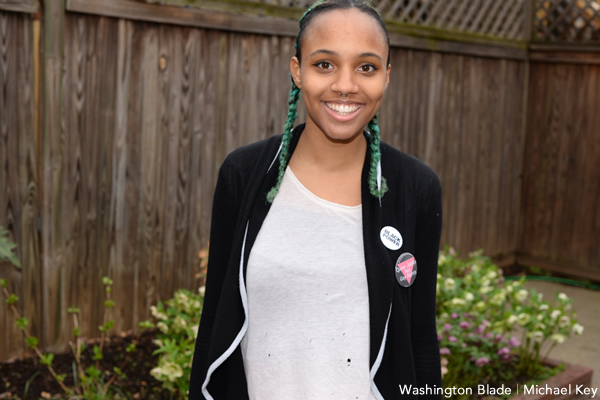
Temitayo Wolff (Washington Blade photo by Michael Key)
NAME: Temitayo Wolff
AGE: 18
RESIDENCE: D.C.
ID AS: queer girl (panromantic, grey-asexual)
CAME OUT: beginning of 11th grade/end of 2013
1. What kind of reaction have you received being out at school?
Within a specific community, I’ve received so much love and support. My friend group is super gay. I haven’t received much open hostility. Some people have a lot of questions.
2. How have your family, friends and community reacted?
My mom wishes I would stop saying words like “pansexual,” which she never heard. I think she accepts my identity even though it doesn’t make sense to her. My dad is also a little confused but he is supportive of my identity, activism and presentation. I have a much younger sister and I think coming out has made her more accepting and socially aware.
3. Have there been any benefits/downsides to being out?
I’ve been really lucky to experience more benefits than downsides when I came out. Coming out provided me with a community of really supportive queer friends online and in D.C. The main downside is tension with my mother.
4. What’s been the hardest or best part of being out?
The best — my queer-platonic partner and my girlfriend.
5. Did you go to Youth Pride last year?
I did attend and had a lot of fun. I appreciate Youth Pride as a space that doesn’t have alcohol and nearly as many people as Capital Pride. However a lot of my friends were consistently misgendered both by peers and by adults who were running the programs, which was disappointing that an event that is supposed to be safe for trans people makes assumptions about people’s gender and reinforces that non-existent binary.
6. What is the biggest misconception LGBT Boomers and Gen Xers have about LGBT Millennials?
I think older folks feel like we are undermining a lot of the work they did with our own activism. When we use social media as a platform for advocacy, they think we are being lazy or unproductive. When we reclaim “queer” as a self-identifier, they think we are disrespecting their struggle to eliminate the use of that word. When we advocate for lesser-known identities like asexuality, pansexuality and non-binary genders, they think we are just making up new words and new forms of oppression when they fought so hard just for basic recognition of the L, G, B and T. I think older LGBTQ folks need to recognize that queer young people of color exist.
NAME: Lance M. Coates III (Lacyy Coates)
AGE: 20
RESIDENCE: D.C.
ID AS: trans woman, early transition stage
CAME OUT: 16
1. What kind of reaction have you received being out at school?
I have received mixed reactions at various schools.
2. How have your family, friends and community reacted?
My family and friends have been supportive while the community as a whole has been very hostile to the point of gay bashing.
3. Have there been any benefits/downsides to being out?
I have become more inspired to live my life openly by the girls at Casa Ruby.
4. What’s been the hardest or best part of being out?
Being able to be myself is the best part.
5. Did you go to Youth Pride last year?
Yes, it was a very happy experience.
6. What is the biggest misconception LGBT Boomers and Gen Xers have about LGBT Millennials?
They don’t really interact with us or teach us the ways.
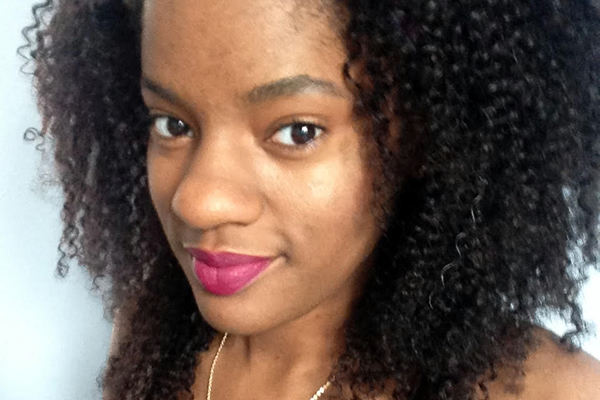
Ebony Rempson (Photo courtesy of Ebony Rempson)
NAME: Ebony Rempson
AGE: 20
RESIDENCE: D.C.
ID AS: queer
CAME OUT: 2009
1. What kind of reaction have you received being out at school?
In high school, it varied from shock and disgust to understanding.
2. How have your family, friends and community reacted?
I had problems with my family at first, especially since I was outed by a family member but things got better. My friends have always been loving. Communities that I’ve found myself a part of have been great support systems and always served as places where I could seek validation.
3. Have there been any benefits/downsides to being out?
I wouldn’t have had a chance to grow the way I did and share my unique story with people had I not been out.
4. What’s been the hardest or best part of being out?
The hardest part about being out as queer has been knowing that there is a third strike against me in the heteronormative and patriarchal society, strikes one and two being black and a woman.
5. Did you go to Youth Pride last year?
Yes and it’s always positive. There’s nothing better than a sense of community.
6. What is the biggest misconception LGBT Boomers and Gen Xers have about LGBT Millennials?
That we’re lazy and self absorbed.
NAME: Shantel Jordan
AGE: 17
RESIDENCE: Arlington, Va.
ID AS: queer/trans
CAME OUT: 2013
1. What kind of reaction have you received being out at school?
My close friends were very supportive. Some other students didn’t understand and made some pretty harsh comments.
2. How have your family, friends and community reacted?
Family was mixed — they were upset at first, but are now mostly supportive.
3. Have there been any benefits/downsides to being out?
The big benefit is being able to be myself. It’s very refreshing not to have to hide.
4. What’s been the hardest or best part of being out?
Hearing from people that God doesn’t like gay people. That was hard.
5. Did you go to Youth Pride last year?
I did. I enjoyed it.
6. What is the biggest misconception LGBT Boomers and Gen Xers have about LGBT Millennials?
That we just want to play on our phones and aren’t really serious about anything.
NAME: James Rosenstein
AGE: 15
RESIDENCE: Arlington, Va.
ID AS: queer
CAME OUT: 2014
1. What kind of reaction have you received being out at school?
I had a number of people ask if I really thought I was gay or if it was a phase but most of my friends were great. They really accept me for me.
2. How have your family, friends and community reacted?
My family has been really great. They wanted to talk a lot when I first told them, but they have always been very supportive.
3. Have there been any benefits/downsides to being out?
I get some comments from other students from time to time, but I’d still rather be out.
4. What’s been the hardest or best part of being out?
Being able to be honest with my friends and parents.
5. Did you go to Youth Pride last year?
I did. I liked it but I couldn’t stay for the entire thing.
6. What is the biggest misconception LGBT Boomers and Gen Xers have about LGBT Millennials?
That young people don’t want to be active in church. I am very active in my church but I understand that many LGBTQ young people don’t want to be.
NAME: Chance
AGE: 18
RESIDENCE: Arlington, Va.
ID AS: gender queer
CAME OUT: 2013
1. What kind of reaction have you received being out at school?
Some people said I was the first queer person they had met. Some said they weren’t sure what queer was so I had to spend some time talking to people in my school. I don’t know if everyone was OK with the answer but most people seemed to be open-minded.
2. How have your family, friends and community reacted?
Most of my family is OK with it. I know I have some people who don’t like the fact that I’m not straight, but I’m OK with that.
3. Have there been any benefits/downsides to being out?
The only downside has been hearing from friends that other people don’t want to hang out with me. That really sucks, but I’m still glad I came out.
4. What’s been the hardest or best part of being out?
The best part has been my relationship with my girlfriend. I don’t think we would be together if I wasn’t out.
5. Did you go to Youth Pride last year?
I did not.
6. What is the biggest misconception LGBT Boomers and Gen Xers have about LGBT Millennials?
I would say that some older people don’t really understand LGBTQ young people. I’ve had older people ask why I want to be called queer.
NAME: Maya Parker
AGE: 20
RESIDENCE: D.C.
ID AS: bisexual
CAME OUT: freshman year of high school
1. What kind of reaction have you received being out at school?
I wasn’t accepted at first as I was one of the first in my high school to come out. I got made fun of mainly by the boys. I figured they were jealous. It somehow was an inspiration to the other girls in the school as they began to come out as well.
2. How have your family, friends and community reacted?
My family pretty much thought of it as a phase. I guess they have swept it under the rug. My friends didn’t like it too well. They started acting uncomfortable around me and not wanting to get dressed in front of me. People heard bisexual and figured I was looking at every woman that would walk past me. My community didn’t react much as I’m more on the feminine side. I’ve only really gotten reaction by my community if I was seen with a more dominant female.
3. Have there been any benefits/downsides to being out?
I actually get to be myself. It gives me a sort of confidence where I can walk outside with my head high without feeling like I have a dark secret.
4. What’s been the hardest or best part of being out?
People thinking you’re “playing both sides of the fence.” It’s hard to get a woman to understand that you’re serious about her when she knows you like men and with men, they can’t seem to get the thought of two women and themselves out of their heads.
5. Did you go to Youth Pride last year?
No
a&e features
Doug Spearman takes his chance
‘Noah’s Arc: The Movie’ debuted on Paramount+ last month

There’s no question that when Patrik-Ian Polk’s series “Noah’s Arc” premiered on Logo 20 years ago, it was a groundbreaking creation. The story of a group of Black gay men and their wonderful friendship. The titular arc was that of the cute main character, Noah (Darryl Stephens), and his close-knit circle of friends, including Chance played by gay actor Doug Spearman. This compelling and loving fraternity may, in fact, be what brought viewers back repeatedly, including a 2008 movie, “Noah’s Arc: Jumping the Broom,” as well as the 2020 “Noah’s Arc” short, and now, a new full-length feature “Noah’s Arc: The Movie,” debuting on Paramount+ on June 20. In the movie, filled with equal measures of laughs and tears, Chance, who has faced a devastating loss, finds his dependable friends there, ready to support and comfort him at a moment’s notice. I had the pleasure of speaking with Spearman the morning of the streaming premiere of “Noah’s Arc: The Movie.”
WASHINGTON BLADE: Doug, since the early 2000s, when the “Noah’s Arc” series premiered on Logo, you have been playing the character of Chance, including in the latest installment, “Noah’s Arc: The Movie.” What was it about Chance that appealed to you as an actor?
SPEARMAN: When Patrik (-Ian Polk) called me to ask me to play him (Chance), I was at JFK airport in the baggage claim, waiting for a suitcase. He explained what the part was. The thing that stuck out to me was the fact that Chance was in a long-term relationship with another Black man. And, they had a child; they had a 4-year-old daughter named Kenya. I had never seen two Black gay men raise a child on TV before. I thought it was the most revolutionary thing I’d ever seen. I immediately thought I’ve got to do this because that was something nobody had seen. I thought it was incredibly important to take the part.
BLADE: “Noah’s Arc: The Movie” was, once again, written and directed by Patrik-Ian Polk, who you just mentioned, is the creator of the entire franchise. What’s the secret to your long-standing working relationship?
SPEARMAN: [Laughs] the whole team, all of us, are like a band of brothers. We fight like brothers, we come together like brothers, we hash things out, we talk, because we’re all very different from our characters. I think the challenge of playing these guys and then uplifting these men, playing a part, especially something written by Patrik, is like solving a math equation. There’s always a challenge that’s enjoyable for me as an actor: to try to find out what it is that Patrik wants, and then how do I do it.
BLADE: I think you do a very good job of it.
SPEARMAN: Thank you very much
BLADE: In the years between “Jumping the Broom” and the new full-length movie, many changes have occurred, and the story addresses some of them, including gay widowhood, which is something that the aging community is now confronting, as well as mental health issues. Please say a few words about how you approached those subjects in the new movie.
SPEARMAN: I had a lot of loss in my life, right before we started shooting. Two months before we started shooting the first series, my mother died. I was going through the grief process through that whole first season. Since then, I’ve lost a lot of people in my life. In fact, when we started shooting the second season, the second week we were shooting, my ex died of a heart attack. I was having to fold that into what I was doing with my life on the set and off the set. You’ve got to show up and you’ve got to do your work. The first two seasons of “Noah’s Arc” are always tinged with the memory of grief. So, when I had to deal with the death that Chance faces (in the new movie), which is a significant death in his life, it wasn’t that hard to reach back, especially the scene in the graveyard. It was something that I unfortunately could pull from personal experience.
BLADE: Shifting gears, the movie features delightful cast surprises, including Jasmine Guy and TS Madison. Did you have a chance to interact with either or both when they were on set?
SPEARMAN: No, I didn’t have any scenes with Jasmine, and I missed her. I wish I had gotten to see her because I actually got to direct Jasmine for a CBS promo shoot for “Queen,” back in the early ‘90s. I had a huge crush on her when she was on “A Different World.” So, I really would have liked to reconnect. But TS and I got to see each other every day because I was in all her scenes. It was extraordinary being around somebody like that. That is one outspoken woman!
BLADE: Even though Beyoncé never makes an appearance in the movie, there’s a lot of talk about her. Would you say you are a Beyoncé fan?
SPEARMAN: Yes! I’m breathing! Yes, I’m a Beyoncé fan. I actually got the chance to meet her. I knew her mom. Her mom was extraordinary to me. She is in the second movie I directed. She also gave us a wedding gown to use in the very first scene of the movie. That family is extraordinarily important to me. Not only just to be a fan, but to be somebody who’s gotten to know them and work with them and see how hard they work. I don’t think anybody works as hard as Tina or Beyoncé.
BLADE: There was a recent news item about gay actor Benito Skinner of the Amazon Prime series “Overcompensating” being told not to bother auditioning for straight roles. As an out actor yourself, how important do you think it is for queer characters to be portrayed by queer actors, and vice versa?
SPEARMAN: Being queer is a multifaceted identity. There’s no one kind of queer person. I think finding the best actor that’s your first circle of casting. I think one of the joys about being an actor is that you get to play different parts. I play straight guys all the time. Dads and husbands and things like that. I think a lot of people are told not to do it. In fact, I wouldn’t be Chance if the actor who was originally cast as Chance hadn’t been pulled out of the series by his agents because they didn’t want him to play a gay character.
BLADE: That’s amazing! Thank you for sharing that. Without giving away too much, the ending of the movie is a little ambiguous, even ending with a question mark. If there was a “Noah’s Arc: The Movie” sequel, would you come back for that?
SPEARMAN: Yeah! A lot of it would depend on what Chance’s journey is going to be like. Patrik and I have conversations like that all the time. He’s very interested and supportive of input. I hope I would be, as we all would be, part of the creative growth with these characters. They live in Patrik’s head, and he writes them, but we’re the ones who have to flesh them out. It’s a conversation, it’s always a conversation.
BLADE: You are currently performing in Molière’s “The Imaginary Invalid” as part of the New Orleans Shakespeare Festival at Tulane. What has this experience been like for you?
SPEARMAN: It’s extraordinary! I started on stage when I was seven. There’s nothing like working with a live audience and having that immediacy. I’m working with an extraordinarily talented cast in a really great play, and I have some of the best scene partners I could ever want.
BLADE: Are there any upcoming film or TV projects you’d like to mention?
SPEARMAN: I’m still a writer, and I’m still a director, and I’ve still got scripts that I would like to make. I have a little something that’s a cross between “Treme” and “Bridgerton” that I want to do. I’m always trying to figure out what the next thing is.
a&e features
Visit Cambridge, a ‘beautiful secret’ on Maryland’s Eastern Shore
New organization promotes town’s welcoming vibe, LGBTQ inclusion

CAMBRIDGE, Md. — Driving through this scenic, historic town on Maryland’s Eastern Shore, you’ll be charmed by streets lined with unique shops, restaurants, and beautifully restored Victorian homes. You’ll also be struck by the number of LGBTQ Pride flags flying throughout the town.
The flags are a reassuring signal that everyone is welcome here, despite the town’s location in ruby red Dorchester County, which voted for Donald Trump over Kamala Harris by a lopsided margin. But don’t let that deter you from visiting. A new organization, Proudly Cambridge, is holding its debut Pride event this weekend, touting the town’s welcoming, inclusive culture.
“We stumbled on a beautiful secret and we wanted to help get the word out,” said James Lumalcuri of the effort to create Proudly Cambridge.
The organization celebrates diversity, enhances public spaces, and seeks to uplift all that Cambridge has to share, according to its mission statement, under the tagline “You Belong Here.”
The group has so far held informal movie nights and a picnic and garden party; the launch party is June 28 at the Cambridge Yacht Club, which will feature a Pride celebration and tea dance. The event’s 75 tickets sold out quickly and proceeds benefit DoCo Pride.
“Tickets went faster than we imagined and we’re bummed we can’t welcome everyone who wanted to come,” Lumalcuri said, adding that organizers plan to make “Cheers on the Choptank” an annual event with added capacity next year.
One of the group’s first projects was to distribute free Pride flags to anyone who requested one and the result is a visually striking display of a large number of flags flying all over town. Up next: Proudly Cambridge plans to roll out a program offering affirming businesses rainbow crab stickers to show their inclusiveness and LGBTQ support. The group also wants to engage with potential visitors and homebuyers.
“We want to spread the word outside of Cambridge — in D.C. and Baltimore — who don’t know about Cambridge,” Lumalcuri said. “We want them to come and know we are a safe haven. You can exist here and feel comfortable and supported by neighbors in a way that we didn’t anticipate when we moved here.”

Lumalcuri, 53, a federal government employee, and his husband, Lou Cardenas, 62, a Realtor, purchased a Victorian house in Cambridge in 2021 and embarked on an extensive renovation. The couple also owns a home in Adams Morgan in D.C.
“We saw the opportunity here and wanted to share it with others,” Cardenas said. “There’s lots of housing inventory in the $300-400,000 range … we’re not here to gentrify people out of town because a lot of these homes are just empty and need to be fixed up and we’re happy to be a part of that.”
Lumalcuri was talking with friends one Sunday last year at the gazebo (affectionately known as the “gayzebo” by locals) at the Yacht Club and the idea for Proudly Cambridge was born. The founding board members are Lumalcuri, Corey van Vlymen, Brian Orjuela, Lauren Mross, and Caleb Holland. The group is currently working toward forming a 501(c)3.
“We need visibility and support for those who need it,” Mross said. “We started making lists of what we wanted to do and the five of us ran with it. We started meeting weekly and solidified what we wanted to do.”
Mross, 50, a brand strategist and web designer, moved to Cambridge from Atlanta with her wife three years ago. They knew they wanted to be near the water and farther north and began researching their options when they discovered Cambridge.
“I had not heard of Cambridge but the location seemed perfect,” she said. “I pointed on a map and said this is where we’re going to move.”
The couple packed up, bought a camper trailer and parked it in different campsites but kept coming back to Cambridge.
“I didn’t know how right it was until we moved here,” she said. “It’s the most welcoming place … there’s an energy vortex here – how did so many cool, progressive people end up in one place?”
Corey van Vlymen and his husband live in D.C. and were looking for a second home. They considered Lost River, W.Va., but decided they preferred to be on the water.
“We looked at a map on both sides of the bay and came to Cambridge on a Saturday and bought a house that day,” said van Vlymen, 39, a senior scientist at Booz Allen Hamilton. They’ve owned in Cambridge for two years.
They were drawn to Cambridge due to its location on the water, the affordable housing inventory, and its proximity to D.C.; it’s about an hour and 20 minutes away.
Now, through the work of Proudly Cambridge, they hope to highlight the town’s many attributes to residents and visitors alike.
“Something we all agree on is there’s a perception problem for Cambridge and a lack of awareness,” van Vlymen said. “If you tell someone you’re going to Cambridge, chances are they think, ‘England or Massachusetts?’”
He cited the affordability and the opportunity to save older, historic homes as a big draw for buyers.
“It’s all about celebrating all the things that make Cambridge great,” Mross added. “Our monthly social events are joyful and celebratory.” A recent game night drew about 70 people.
She noted that the goal is not to gentrify the town and push longtime residents out, but to uplift all the people who are already there while welcoming new visitors and future residents.
They also noted that Proudly Cambridge does not seek to supplant existing Pride-focused organizations. Dorchester County Pride organizes countywide Pride events and Delmarva Pride was held in nearby Easton two weeks ago.
“We celebrate all diversity but are gay powered and gay led,” Mross noted.
To learn more about Proudly Cambridge, visit the group on Facebook and Instagram.
What to see and do
Cambridge, located 13 miles up the Choptank River from the Chesapeake Bay, has a population of roughly 15,000. It was settled in 1684 and named for the English university town in 1686. It is home to the Harriet Tubman Museum, mural, and monument. Its proximity to the Blackwater National Wildlife Refuge makes it a popular stop for birders, drawn to more than 27,000 acres of marshland dubbed “the Everglades of the north.”
The refuge is walkable, bikeable, and driveable, making it an accessible attraction for all. There are kayaking and biking tours through Blackwater Adventures (blackwateradventuresmd.com).
Back in town, take a stroll along the water and through historic downtown and admire the architecture. Take in the striking Harriet Tubman mural (424 Race St.). Shop in the many local boutiques, and don’t miss the gay-owned Shorelife Home and Gifts (421 Race St.), filled with stylish coastal décor items.
Stop for breakfast or lunch at Black Water Bakery (429 Race St.), which offers a full compliment of coffee drinks along with a build-your-own mimosa bar and a full menu of creative cocktails.
The Cambridge Yacht Club (1 Mill St.) is always bustling but you need to be a member to get in. Snapper’s on the water is temporarily closed for renovations. RaR Brewing (rarbrewing.com) is popular for craft beers served in an 80-year-old former pool hall and bowling alley. The menu offers burgers, wings, and other bar fare.
For dinner or wine, don’t miss the fantastic Vintage 414 (414 Race St.), which offers lunch, dinner, wine tasting events, specialty foods, and a large selection of wines. The homemade cheddar crackers, inventive flatbreads, and creative desserts (citrus olive oil cake, carrot cake trifle) were a hit on a recent visit.
Also nearby is Ava’s (305 High St.), a regional chain offering outstanding Italian dishes, pizzas, and more.
For something off the beaten path, visit Emily’s Produce (22143 Church Creek Rd.) for its nursery, produce, and prepared meals.
“Ten minutes into the sticks there’s a place called Emily’s Produce, where you can pay $5 and walk through a field and pick sunflowers, blueberries, you can feed the goats … and they have great food,” van Vlymen said.
As for accommodations, there’s the Hyatt Regency Chesapeake Bay (100 Heron Blvd. at Route 50), a resort complex with golf course, spa, and marina. Otherwise, check out Airbnb and VRBO for short-term rentals closer to downtown.
Its proximity to D.C. and Baltimore makes Cambridge an ideal weekend getaway. The large LGBTQ population is welcoming and they are happy to talk up their town and show you around.
“There’s a closeness among the neighbors that I wasn’t feeling in D.C.,” Lumalcuri said. “We look after each other.”
a&e features
James Baldwin bio shows how much of his life is revealed in his work
‘A Love Story’ is first major book on acclaimed author’s life in 30 years

‘Baldwin: A Love Story’
By Nicholas Boggs
c.2025, FSG
$35/704 pages
“Baldwin: A Love Story” is a sympathetic biography, the first major one in 30 years, of acclaimed Black gay writer James Baldwin. Drawing on Baldwin’s fiction, essays, and letters, Nicolas Boggs, a white writer who rediscovered and co-edited a new edition of a long-lost Baldwin book, explores Baldwin’s life and work through focusing on his lovers, mentors, and inspirations.
The book begins with a quick look at Baldwin’s childhood in Harlem, and his difficult relationship with his religious, angry stepfather. Baldwin’s experience with Orilla Miller, a white teacher who encouraged the boy’s writing and took him to plays and movies, even against his father’s wishes, helped shape his life and tempered his feelings toward white people. When Baldwin later joined a church and became a child preacher, though, he felt conflicted between academic success and religious demands, even denouncing Miller at one point. In a fascinating late essay, Baldwin also described his teenage sexual relationship with a mobster, who showed him off in public.
Baldwin’s romantic life was complicated, as he preferred men who were not outwardly gay. Indeed, many would marry women and have children while also involved with Baldwin. Still, they would often remain friends and enabled Baldwin’s work. Lucien Happersberger, who met Baldwin while both were living in Paris, sent him to a Swiss village, where he wrote his first novel, “Go Tell It on the Mountain,” as well as an essay, “Stranger in the Village,” about the oddness of being the first Black person many villagers had ever seen. Baldwin met Turkish actor Engin Cezzar in New York at the Actors’ Studio; Baldwin later spent time in Istanbul with Cezzar and his wife, finishing “Another Country” and directing a controversial play about Turkish prisoners that depicted sexuality and gender.
Baldwin collaborated with French artist Yoran Cazac on a children’s book, which later vanished. Boggs writes of his excitement about coming across this book while a student at Yale and how he later interviewed Cazac and his wife while also republishing the book. Baldwin also had many tumultuous sexual relationships with young men whom he tried to mentor and shape, most of which led to drama and despair.
The book carefully examines Baldwin’s development as a writer. “Go Tell It on the Mountain” draws heavily on his early life, giving subtle signs of the main character John’s sexuality, while “Giovanni’s Room” bravely and openly shows a homosexual relationship, highly controversial at the time. “If Beale Street Could Talk” features a woman as its main character and narrator, the first time Baldwin wrote fully through a woman’s perspective. His essays feel deeply personal, even if they do not reveal everything; Lucian is the unnamed visiting friend in one who the police briefly detained along with Baldwin. He found New York too distracting to write, spending his time there with friends and family or on business. He was close friends with modernist painter Beauford Delaney, also gay, who helped Baldwin see that a Black man could thrive as an artist. Delaney would later move to France, staying near Baldwin’s home.
An epilogue has Boggs writing about encountering Baldwin’s work as one of the few white students in a majority-Black school. It helpfully reminds us that Baldwin connects to all who feel different, no matter their race, sexuality, gender, or class. A well-written, easy-flowing biography, with many excerpts from Baldwin’s writing, it shows how much of his life is revealed in his work. Let’s hope it encourages reading the work, either again or for the first time.

